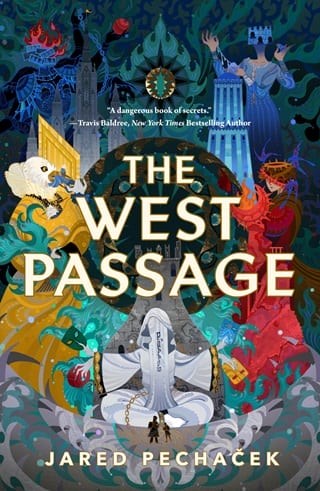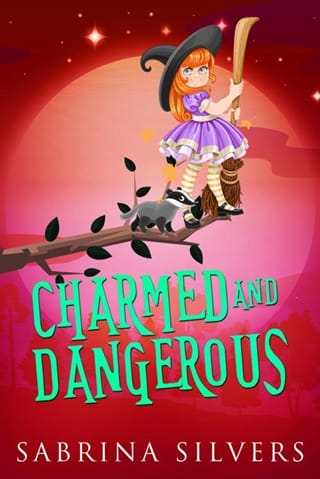21. Kew and Frin Start Walking
21. Kew and Frin Start Walking
Kew and Frin left the Obsidian courts after breakfast the next day. During the night, the Lady had progressed to another of her mansions, but she'd left orders that Kew should take a no-name with him as a squire. What's a squire? the beekeepers and apprentices asked themselves, but nobody would dare ask the Lady. A servant? No, since both would be no-names, free of rank and its concerns, a squire must mean a kind of friend for Kew, and that in turn meant Frin.
Frin did not want to leave the court he had known his whole life. His parents were beekeepers; he had grown up playing among the slow-striding hives; he had expected to become a beekeeper himself within a year or two. Now all that was in jeopardy, merely because this stranger had somehow charmed the Lady into granting him a favor. Everyone in the courts of Black knew that people who went to the tower rarely returned. It was a place of marvels so exquisite that they became dangers, and of dangers so exquisite they became marvels. You might stay for love of it, or you might die for love of it. Either way, you would remain.
As a parting gift, One Robin gave Frin a bee sleeping in a red wooden box.
"If you open it, she'll wake up," said One. "Give her any message and send her back to us. Likely we won't be able to help, but we'll—we'll leastways know what you wanted."
In her hand she held the hornet; it had been removed from Kew that morning. It curled up in her palm like a tiny cat, and she stroked it absently.
Frin put the bee in a green cloth bag along with his spare tunic, hood, and puttees, and as much water, bread, and dried fruit as he could fit. He joined Kew near the door. They would not be taking the West Passage: the rubbish made it nearly impassable. One Robin had sketched a quick map to guide them through the halls.
Take the Long Gallery until you come to the seventh red door on the right. The Gallery ran nearly the length of the Passage walls, and it was lined with portraits of Obsidian Ladies, going all the way back to the lineage's foundation at the end of Apple, when the Guardians' steel had been used to kill the last Apple Lady. Frin did not look at them, only at the frayed remnants of the carpet on the floor. Kew stared openly at the paintings, but his expression was as blank as if the wall itself had been.
"You all right?" said Frin.
"My head feels a little odd," said Kew. "I suppose I should have gotten more sleep."
"We can stop in here if you want," said Frin, making as if to take off his pack. "You ain't walked much lately."
"No, no," said Kew. They passed another painting of an Obsidian, great hands splayed. A shudder ran up Kew's spine, hit his skull, and became a terrible headache. He didn't say anything to Frin.
Go through the red door and take the upper colonnade north . Already they were out of Frin's knowledge. The door opened onto a landing looking out over a marble courtyard full of statues. To the right, a stone staircase went down to a colonnade. To the left, it went up to another, identical in every respect except location. Both were lined with caryatids in rhythmic dancers' poses. Kew felt a twinge of memory: their swaying postures echoed the Labyrinth Dance that Hawthorn and the women had done every spring on a worn-away track in one of the courtyards of Grey. Frin felt a similar twinge: the caryatids looked like the keepers dancing to awaken the bees at the end of winter.
"It must be Lady-day by now," said Kew. "I don't like losing track of time."
"What's Lady-day?" said Frin.
"You don't have it? I thought it was celebrated all over the palace."
"Neh. We've got the quarter days, of course, and the intercalaries, and—" Frin noticed Kew's expression and let his sentence melt away into a shrug. After a moment of walking, Frin went on, "I guess Lady-day is for your own Lady?"
"Yes, I think so. Hawthorn had a book about it, but she said the book didn't tell the whole story."
"What was the whole story?" said Frin, feeling that a good squire must be able to converse about such things.
"There was a Grey Lady who—I don't know. She bent the West Passage as if she were making a miracle. I understand directions well enough, but this had something to do with—changing them. That day was celebrated as Lady-day. I don't really know why. The book was missing a lot of pages."
On the colonnade's open side was Black Tower. This was the closest Kew had ever been to it. The tower's height could not be guessed. From Grey you could see the great piers and flying buttresses that held it up, but now Kew could tell that the piers sprouted from a spherical base, then angled upward like the petals of a flower. While he had only ever known it to have three such "arms," at this new angle he saw that it had five. Each pier was buttressed in turn by a smaller one, and so on, making this vast structure a lacy filigree of stone. Every time he saw Black Tower, it showed him a new face.
Perhaps because he was looking at these faces so intently, he got them lost.
 Fullepub
Fullepub 



